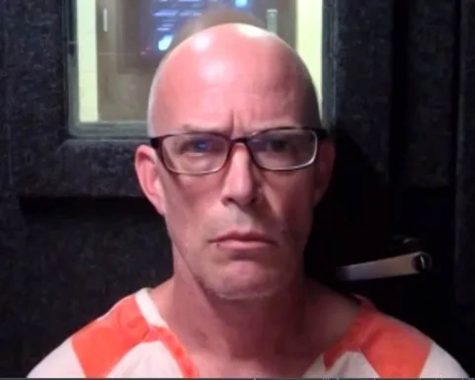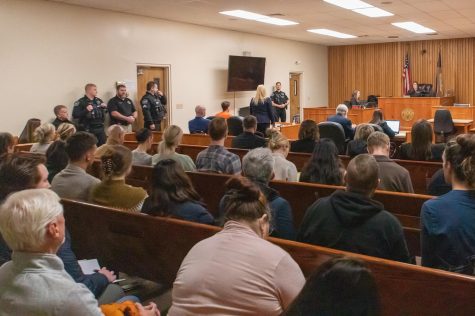University policy for sexual assault emphasizes an educational outcome
April 29, 2015
As the prevalence of sexual assault culture continues to gain face among college campuses across America, institutions such as Washington State University are always on the move to keep up with effective policy and procedure.
Under the federal statute of the Clery Act and Title IX of the Education Amendments of 1972, there is a lot of federal oversight of WSU in regards to how it handles cases like sexual assault, such as the application of the preponderance of evidence when investigating cases.
“We apply a standard of preponderance of evidence, which is different from the beyond a reasonable doubt standard in criminal cases,” said Kim Anderson, director of the Office for Equal Opportunity (OEO). “Evidence mostly comes from both parties and witnesses; if there is physical evidence then they are encouraged to go to the police so that the police can further analyze that.”
According to the Washington State Legislature’s general terms defined, ‘preponderance of evidence’ is evidence which, when fairly considered, produces the stronger impression, has the greater weight, and is the more convincing as to its truth when weighted against the evidence in opposition thereto.
In February 2013, WSU received notice of investigation through the Office of Civil Rights (OCR) in the Department of Education. Officials from the OCR visited the campus and the investigation has been ongoing since.
“Since we have received notice, there have been quite a few changes in the make-up of this office,” Anderson said.
Anderson also said the office has hired two new investigators and is currently searching for another investigator to help with ADA responsibilities, which also helps free up more time for sexual assault investigations.
She also noted that, like all university campuses, there is a high concentration of young people, which can lead to an atmosphere that is conducive to sexual assault.
“We know that statistically, one in five women and one in sixteen – about six percent – of men experience some form of attempted or completed sexual assault while they’re in college; those numbers are astronomical,” she said. “It’s an issue that is very prevalent on all of the college campuses across the country and I think people are starting to realize what an impact that has on an individual and on an individual’s ability to pursue an education.”
After gathering all possible evidence for a sexual assault case, and if the investigators determine the case needs to be adjudicated, a memorandum is compiled and sent to the Office of Student Conduct.
The case is reviewed by the conduct board, which is made up of faculty, staff and students who are specially trained to deal with sexual assault cases. The conduct board meets within 10 days after hearing from the OEO. The conduct hearing itself takes place with three to four days after the initial meeting.
When a decision is reached, both the complainant and accused are notified of the decision and why it was made. Both parties also have a right to appeal.
“There is a lot of equity in our process. The respondent has a right, the complainant has a correspondent right, so the University is just facilitating that process throughout the disciplinary procedures,” said Adam Jussel, Director of the Office of Student Conduct.
Melynda Huskey, Dean of Students, said the goal of the adjudication process is to be primarily educational and fair.
“The goal is to provide a supportive educational environment for everyone,” she said. “Sometimes it’s necessary for the well-being of the community to remove someone who has caused significant harm to the community, and that’s when the expulsion input, where we feel that it is necessary for the well-being of the community, that somebody needs to find another place to be.”
Jussel said appeals are accepted within 21 days of the decision and are presented to an appeals board in writing. The other party is then notified and has the opportunity to look at the appeal and submit a sur appeal if they choose.
The conduct board itself undergoes intensive training at the beginning of the year as well as refresher training in the spring and before each hearing. One form of training in particular that the board undergoes is neurobiological response to trauma to better comprehend the complexities of posttraumatic stress disorder.
While it is a rarity, there are times when a complainant is within a close proximity of the accused, such as both parties living in the same residence hall. If the complainant is uncomfortable with the situation, the University has interim measures in place to keep both parties safe.
Jussel said the Dean of Students works with Residence Life to move the respondent to another location. The respondent receives a letter from the office when an investigation begins describing the allegations so they have better understanding as to why they are being moved.
“It is for the safety of both parties, really, to try to get them in a place where they are both comfortable. So we will take those actions on behalf of the parties and make sure there is not a situation where either party is uncomfortable,” he said.
Huskey works directly with handling interim measure situations.
“My office is the office that coordinates all of those pieces and makes sure that everyone is getting what they need,” she said. “We provide advising about the conduct process for respondents, so if there’s a finding that there was a violation, that gets referred to Student Conduct.”
Huskey also said her office has acquired enough funding and is in the late stages of hiring a case manager for Executive Policy 15 cases (the policy prohibiting discrimination, sexual harassment, and sexual misconduct), who would oversee interim measures and making sure students have access to necessary resources.
Jussel said he receives fewer than 10 memorandums on his desk each semester regarding sexual assault.
Each year, WSU takes in nearly 4,000 freshmen who are generally required to live in a residence hall their first year.
“With Residence Life, we spend a lot of time trying to do educational programming, but also on top of that we try to provide a safe community,” said Edwin Hamada, Director of Residence Life. “So part of our preventative measures is really trying to get a feeling of safety within their own community out there and then on top of that try to put on some educational programs.”
Hamada’s example program was “Can I Kiss You?” a bystander intervention program that happens during Week of Welcome. Residence Life also works with Green Dot and Health & Wellness Services for educational programming.
Resident Advisers (RAs), who are students and oversee floor functionality and safety in residence halls, are trained to identify situations that can be harmful.
“In terms of physical prevention, we have staff members that are doing rounds on weekends and every night they’re doing rounds,” Hamada said. “When they do come across situations where possibly somebody’s in a very vulnerable state – maybe they look like they’re passed out or they’re extraordinarily intoxicated – we will involve paramedics to do an assessment to make sure that they’re not just going back to the rooms and putting themselves in danger, either physically from a life and death thing or from a potential sexual assault.”
Hamada said any situation in which conduct has been violated – including sexual conduct – Residence Life involves the police, OEO and student conduct.
Reports of sexual assault have been on the rise in Pullman, however, this may be just because people are beginning to feel more confident about reporting the crime rather than the crime itself being on the rise.
Huskey believes the best advice to students about combating rape culture is to not perpetuate it.
“So the first thing I always say is don’t be a rapist. That is the one thing we could do that would absolutely resolve the problem instantly,” she said. “Do not sexually assault people. The problem will disappear and I always want to set up first because I think the impulse is to ‘don’t drink, don’t let other people touch your drinks, go out with friends who keep active.
“Your real responsibility is on the people who are perpetrating the assault, not on the people who are the victims,” Huskey said. “We don’t say to people ‘don’t have a lot of money and then you won’t get robbed;’ people need to stop being rapists.”


















